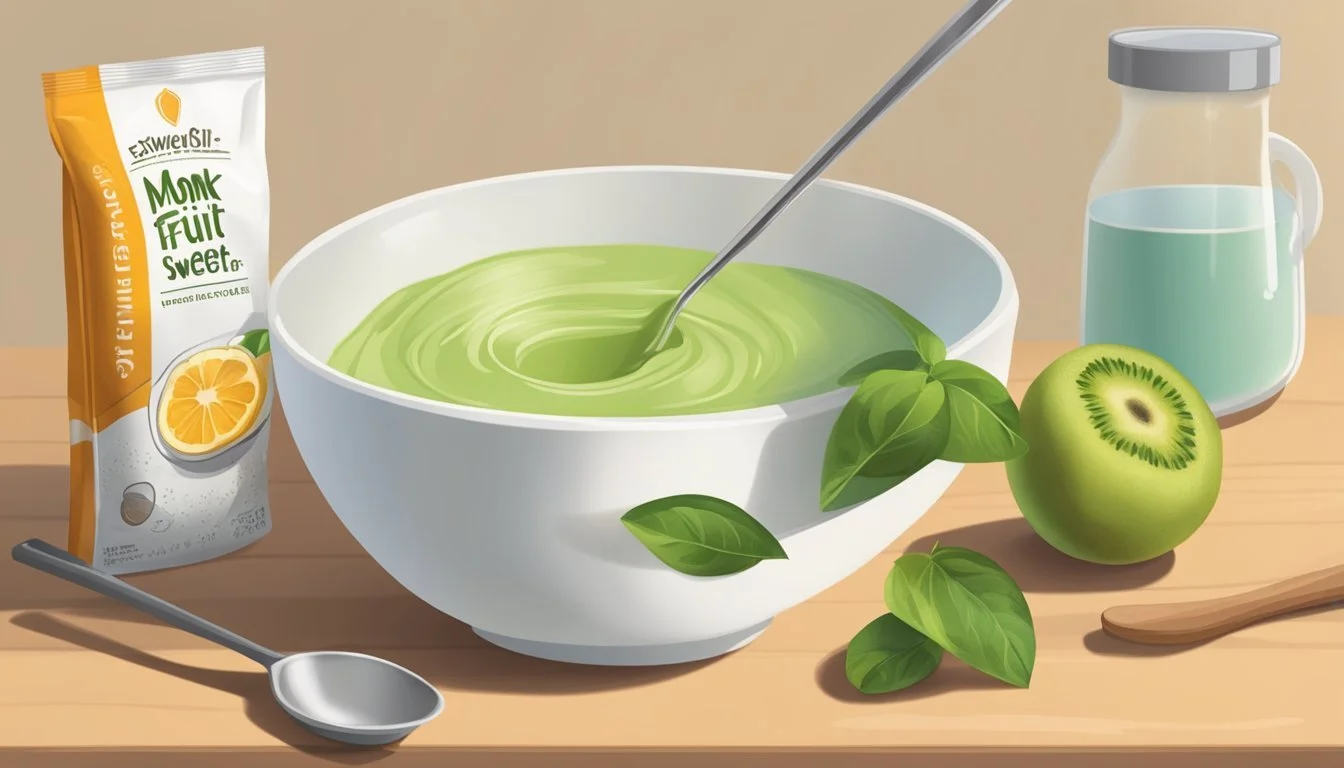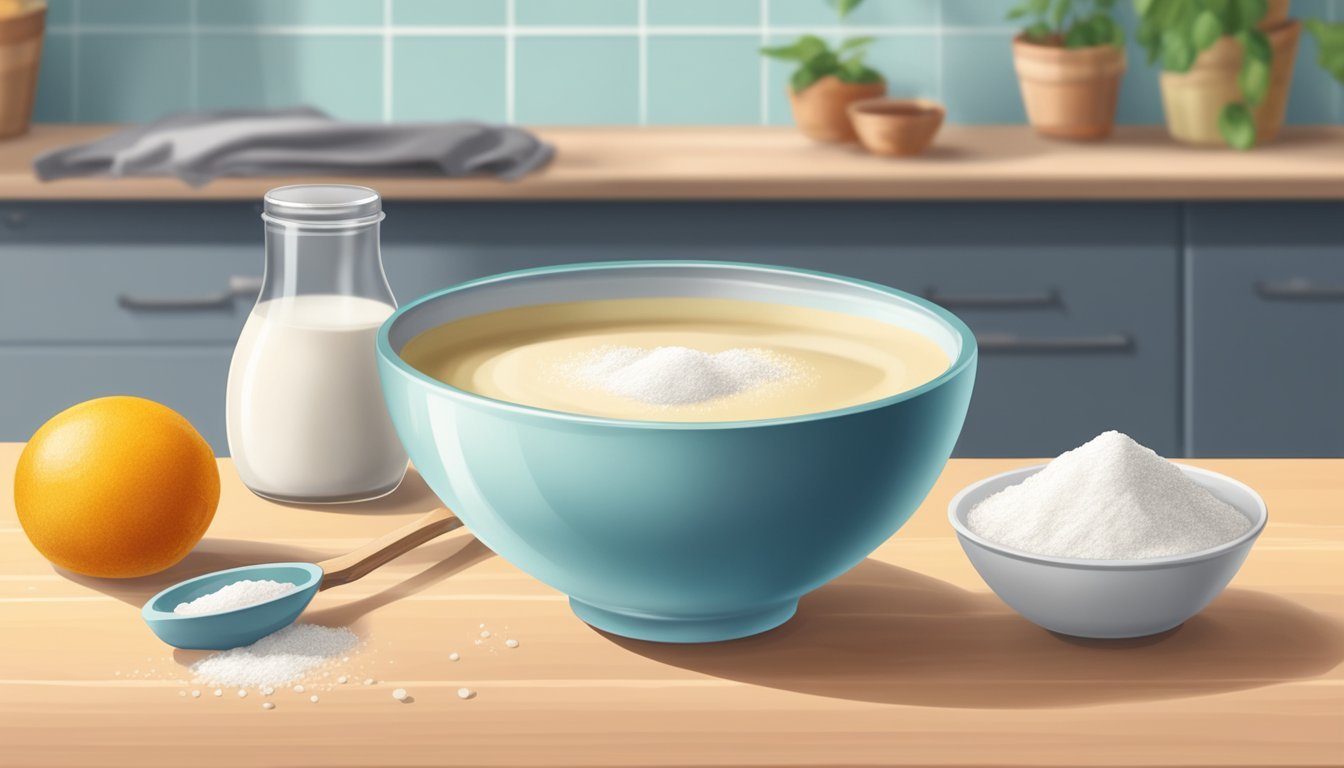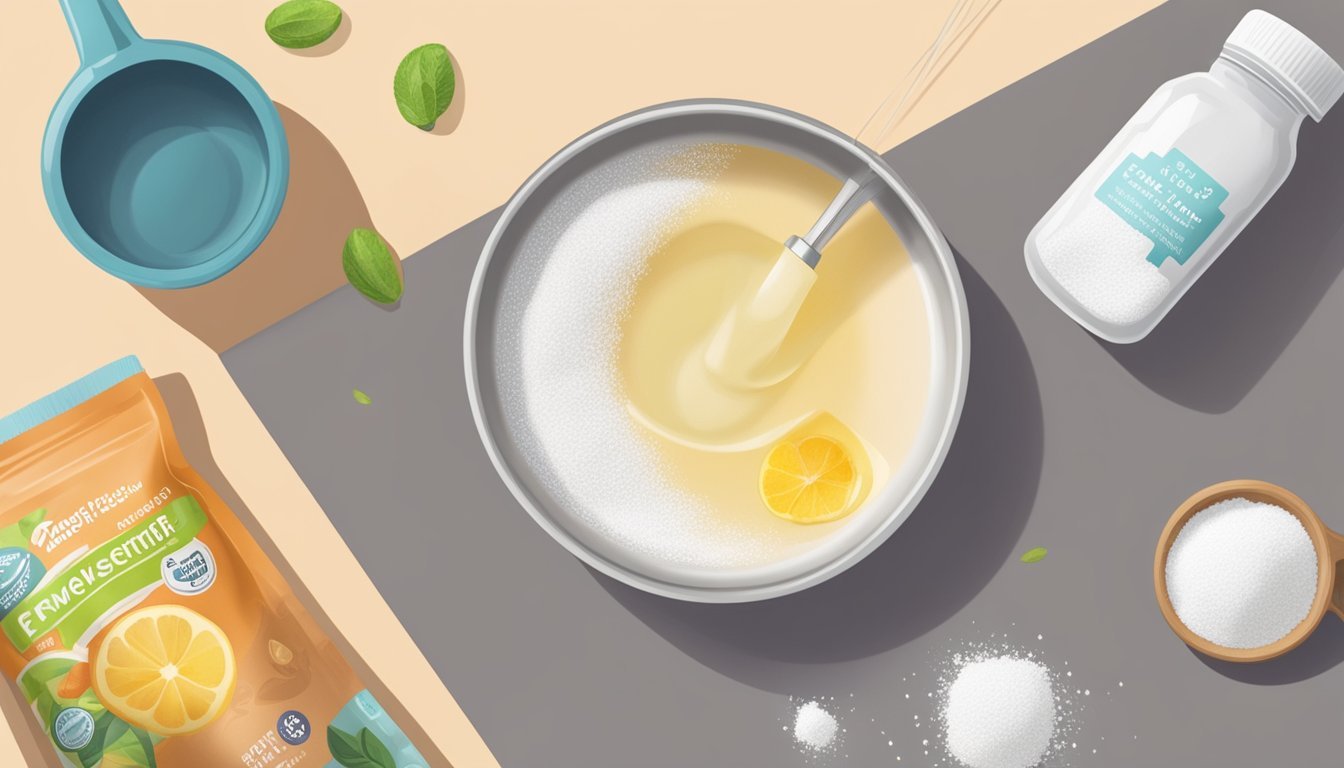How to Substitute Erythritol for Monk Fruit Sweetener
Baking Adjustments Explained
Substituting erythritol for monk fruit sweetener in baking is a common consideration for those looking to adjust their recipes for dietary preferences or to work with available ingredients. Erythritol and monk fruit are popular natural sweeteners that offer lower-calorie alternatives to traditional sugar, making them favorable options for those managing their sugar intake or following certain dietary plans such as a ketogenic diet.
My Latest Videos
When it comes to using erythritol as a substitute for monk fruit, it is important to understand the sweetness profiles and physical properties of each. Erythritol tends to be less sweet than monk fruit sweetener, and may require adjustments to measurements to achieve the desired sweetness. Additionally, erythritol can affect the texture of baked goods, potentially yielding a drier result which may necessitate the addition of extra moisture to maintain the ideal texture.
Bakers also need to be mindful of the differences in how these sweeteners react under heat. While both erythritol and monk fruit are heat-stable and suitable for baking, erythritol may exhibit a cooling effect upon dissolving, which can influence the final taste experience. Understanding these properties ensures that substitutions can be made confidently and with minimal impact on the overall outcome of the baked items.
Understanding Sweeteners
When selecting a sugar substitute for baking, it's crucial to understand the types of sweeteners available, the benefits of natural versus artificial options, and how different sweeteners like erythritol and monk fruit can be compared and substituted.
Types of Sweeteners
Sweeteners can be categorized into natural and artificial types. Natural sweeteners, such as stevia, monk fruit, and raw honey, are derived from plants and other natural sources. They provide sweetness while offering varying degrees of additional nutrients. Artificial sweeteners, like aspartame and sucralose, are man-made and typically contain zero calories. Sugar alcohols such as erythritol also fall within the spectrum of sweeteners, offering a reduced-calorie option often used in low-carbohydrate diets like keto.
Benefits of Natural vs Artificial Sweeteners
Natural sweeteners often possess health benefits such as antioxidants, vitamins, and minerals, lacking in artificial sweeteners. However, the main advantage of artificial sweeteners is their zero-calorie content and their minimal impact on blood sugar levels, making them suitable for those managing diabetes and adhering to a ketogenic diet. The glycemic index of a sweetener indicates its effect on blood sugar—natural sweeteners like monk fruit have a low glycemic index, attracting individuals looking for healthier lifestyle choices.
Sweetener Comparison: Erythritol and Monk Fruit
Erythritol is a sugar alcohol with approximately 60-70% of the sweetness of sugar and almost zero calories. In comparison, monk fruit sweetener, a natural, plant-based sweetener, contains compounds called mogrosides that are up to 300 times sweeter than sugar and has no calories.
Sweetener Sweetness Relative to Sugar Calories Glycemic Index Erythritol 60-70% Zero Very Low (<1) Monk Fruit 150-300 times Zero Zero
Choosing between these sweeteners depends on personal dietary needs and recipe requirements. For keto-friendly recipes, both options are suitable as they have a low glycemic index and don't spike blood sugar levels. Monk fruit is more potent in sweetness, so less is needed, whereas erythritol might require a 1:1 ratio for sugar but may need adjustments for moisture due to its drying effect in baking.
Baking Fundamentals
In the realm of baking, the presence and type of sweetener are critical to the success of many recipes, affecting everything from taste to texture. Understanding the essential roles that sugar plays and how sugar substitutes can be utilized is decisive for creating delicious, texture-appropriate baked goods.
Importance of Sugar in Baking
Sugar acts as more than just a sweetener in baking; it is integral to the structure and texture of baked goods. In the process of creaming, sugar aerates the fat, contributing to the leavening and resulting in a light, tender crumb. Sugar also affects the moisture content; it is hygroscopic, meaning it attracts and retains water, which keeps baked items moist. The caramelization of sugar at high temperatures adds rich flavor and color. Without sugar, products may turn out dense, dry, and lack the golden-brown finish that is often desirable.
Key Roles of Sugar:
Sweetening
Texture enhancement
Moisture retention
Contributing to browning and flavor through caramelization
Role of Sugar Substitutes
Sugar substitutes like erythritol and monk fruit sweetener provide alternatives for those seeking lower-calorie or low-carb options, like in keto-friendly baking. These substitutes vary in their conversion rates when replacing sugar. Monk fruit sweetener is exceptionally sweet due to mogrosides and typically requires less volume than sugar—often 1/3 to 1/2 cup of monk fruit sweetener for each cup of sugar required. Erythritol, a sugar alcohol, often measures cup-for-cup like sugar, but in recipes that originally call for erythritol, a 1:1 blend of erythritol and monk fruit may demand 3/4 cup for each cup of erythritol to achieve similar sweetness.
Baking with Sugar Substitutes:
Substitute Relative Sweetness Usage Comparison Erythritol Similar to sugar 1:1 with sugar; adjust for blends Monk Fruit Up to 300 times sweeter than sugar 1/3 to 1/2 cup for each cup of sugar
When substituting sugar with these sugar-free alternatives in baking recipes, bakers must attentively adjust other ingredients to maintain the desired texture and flavor, as substitutes can behave differently than sugar, especially in terms of moisture content and caramelization properties.
Monk Fruit Sweetener
Monk Fruit Sweetener, derived from the monk fruit or luo han guo, offers a unique alternative for sugar replacement. Notably, it contains no sugars yet exhibits powerful sweetness.
Origins and Properties of Monk Fruit
Monk fruit hails from China and has been used in traditional Chinese medicine for centuries. The fruit grows on a vine and is part of the gourd family. Its sweetness is due to substances called mogrosides, which are antioxidants. These mogrosides are metabolized differently than sugar and do not raise blood sugar levels, which makes monk fruit sweetener particularly appealing for individuals monitoring their glucose intake. Additionally, monk fruit has been recognized for its antioxidant properties and potential anti-inflammatory benefits.
Culinary Uses and Advantages
In the kitchen, monk fruit sweetener is versatile:
Baking: Substitute for sugar in a 1:1 ratio or refer to conversion charts for specific brands.
Beverages: Dissolves well in liquids, sweetening without aftertaste.
Dietary Benefits: Ideal for those on ketogenic diets due to its zero-calorie content.
Monk fruit sweetener is heat-stable, so it can be used in baking without breaking down or losing sweetness. It's a useful ingredient for those looking to reduce sugar intake without sacrificing taste, mixing well in recipes and offering a sweetness that is close to that of sugar. It does not contain the sugar alcohols that erythritol does, which can be beneficial for those avoiding such additives. Moreover, the antioxidant properties of mogrosides in monk fruit may contribute to health benefits not typically found in other sweeteners.
Erythritol in Baking
In baking, erythritol serves as a versatile sugar alcohol that provides sweetness while offering certain benefits and presenting unique challenges.
Characteristics of Erythritol
Erythritol is a sugar alcohol commonly used as a zero-calorie sweetener in various food products, including baked goods. It typically contains about 60%-80% of the sweetness of sugar, which means adjustments may be required to achieve the desired taste when substituted in recipes. Erythritol's molecular structure allows it to provide a sweetness free of the calories found in traditional sugar. It is also well-known for its lack of a bitter aftertaste, which is a common problem with other sweeteners.
One of the notable characteristics of erythritol is that it has a cooling effect on the palate. This sensation arises because erythritol tends to dissolve endothermically, producing a cooling feeling as it dissolves in saliva. Additionally, erythritol is unique among sugar alcohols because it does not cause digestive issues for most people, due to the fact that the body absorbs it well before it enters the colon.
Advantages and Challenges in Baking
Advantages:
Zero-Calorie: Erythritol offers a guilt-free addition to baked goods for those watching their calorie intake.
Low Glycemic Impact: It does not spike blood glucose levels, making it a safer choice for individuals with diabetes.
Tooth-Friendly: It does not contribute to tooth decay since bacteria in the mouth do not metabolize erythritol into acids.
Challenges:
Sweetness: As erythritol is less sweet than sugar, bakers may need to use more to obtain the same level of sweetness.
Moisture Content: Recipes may need adjustment, as erythritol can have a drying effect on baked goods.
Cooling Effect: The distinctive cooling sensation might not be suitable for all types of baked items, potentially altering the expected flavor profile.
When replacing monk fruit sweetener with erythritol, bakers may need to experiment with proportions to find the right balance, considering the sweetness and moisture differences. Erythritol does not contain mogroside, which is the compound responsible for the sweetness in monk fruit, making the direct substitution not always straightforward.
Substituting Sweeteners
When substituting sweeteners in baking, precision is key to maintain flavor and texture. The conversion between monk fruit and erythritol involves understanding their relative sweetness and how they interact with other ingredients.
Conversion Guidelines
Monk fruit sweetener is significantly sweeter than erythritol—monk fruit can be up to 200 times sweeter than sugar, while erythritol has about 70% of the sweetness of sugar. A conversion chart is crucial for making accurate substitutions without compromising the taste.
Monk Fruit to Erythritol: For every 1 teaspoon of monk fruit sweetener, use about 1 & 1/3 teaspoons of erythritol.
Erythritol to Monk Fruit: Reverse the ratio for the opposite conversion—use about 3/4 teaspoon of monk fruit sweetener for every 1 teaspoon of erythritol.
Monk Fruit vs Erythritol Substitution Techniques
While erythritol can substitute for monk fruit on a volume-for-volume basis, the baker must consider additional adjustments. Erythritol tends to have a cooling effect and can create a drier texture in baked goods, so one might need to add extra moisture. Here are techniques for successful substitution:
Moisture: To counteract erythritol's drying effect, introduce additional wet ingredients, like yogurt or applesauce.
Cost: Erythritol is generally less expensive than monk fruit, which can be a deciding factor for some bakers.
Sugar-Free: Both erythritol and monk fruit are considered sugar-free sweeteners and are suitable for people looking to reduce their sugar intake.
Substitutes should maintain the desired sweetness without altering the original recipe dramatically. Bakers may need to make several attempts and taste tests to perfect their specific substitution technique.
Recipe Adaptations
When substituting erythritol for monk fruit sweetener in baking, it's vital to adjust both wet and dry ingredients to maintain the desired texture and flavor of baked goods.
Adjusting Wet and Dry Ingredients
Substituting sugar alternatives in recipes often requires a balance between dry and wet ingredients to achieve the perfect bake. With erythritol being less sweet than monk fruit sweetener and potentially causing dryness, bakers may need to add more liquid to the mix. For instance:
Cookies: To substitute erythritol in chocolate chip cookies, maintain the creaminess by adding a tablespoon of milk or water for every cup of flour to compensate for erythritol's drying effects.
Muffins: Blueberry muffins made with erythritol might need an extra 2 tablespoons of butter to retain moisture, especially if using coconut flour, which absorbs more liquid than regular flour.
Sugar Alternatives for Popular Baked Goods
Baked goods have specific requirements when it comes to sugar alternatives for both texture and rise. Here's a concise guide:
Chocolate Chip Cookies:
Monk fruit sweetener: Use 3/4 cup granulated or powder form to replace 1 cup sugar.
Erythritol: Use 1 1/3 cups of granulated to ensure cookies don't turn out too hard.
Blueberry Muffins:
Monk fruit sweetener: Opt for 1/2 to 3/4 cup, depending on desired sweetness, to replace 1 cup sugar.
Erythritol: Increase to 1 cup if using granulated for every 1 cup of sugar mentioned in the recipe. Add a bit more flour or reduce liquid slightly to perfect batter consistency.
Health Considerations
When considering a substitution of erythritol for monk fruit sweetener in baking, it is important for individuals, especially those with diabetes or those following a low-carb or keto diet, to understand the effects on blood sugar and the nature of these sweeteners.
Impact on Blood Sugar and Diabetes
Erythritol:
Glycemic Index: 0 (does not raise blood glucose levels)
Caloric Content: 0.24 calories per gram (almost zero calories)
Monk Fruit Sweetener:
Glycemic Index: 0 (no impact on blood sugar)
Caloric Content: 0 calories (considered a no-calorie sweetener)
Both erythritol and monk fruit are suitable for individuals with diabetes due to their negligible effects on blood glucose levels. They do not contribute to the sugar spikes associated with regular sugar, making them preferable choices for managing blood sugar.
All Natural Sweetener Choices
Erythritol:
Origin: Naturally derived from fermented sugars
Composition: Contains no artificial ingredients or chemicals
Monk Fruit Sweetener:
Origin: Extracted from the monk fruit, a natural source
Composition: Often combined with erythritol to balance sweetness and reduce any potential aftertaste
Monk fruit sweetener also possesses antioxidant properties, as it is derived from a fruit known for its health-promoting qualities. Both erythritol and monk fruit sweeteners are considered keto-friendly and suitable for those on low-carb diets due to their low to zero calorie content. They provide a sweet taste without the addition of calories or impact on insulin levels. While monk fruit sweetener may have an aftertaste for some, erythritol is generally recognized for having a clean, sweet taste with minimal aftertaste.
Shopping for Sweeteners
When selecting sweeteners for baking, one must consider availability, brand variety, and cost-effectiveness. These factors are important to find the right erythritol or monk fruit sweetener that meets your baking needs.
Availability and Brand Options
Erythritol and monk fruit sweeteners are available at most grocery stores and online retailers. Brands such as Lakanto Monkfruit Sweetener and Swerve offer a range of options, including granulated and powdered forms, suitable for different types of baking recipes. Pure Monk is an example of a brand that specializes in monk fruit sweeteners without other additives. It's important to note that some brands may combine these sweeteners with sugars like allulose or coconut sugar to balance sweetness and texture.
Lakanto and Swerve are widely available and have various products including blends with erythritol.
Pure Monk focuses on monk fruit only products, which may be desirable for those avoiding other sweeteners.
Availability can vary, with some stores having a more extensive selection than others. Specialty health food stores are likely to carry a broader range of natural sweetener options.
Cost Comparison and Budgeting
The cost of sweeteners can differ significantly based on the brand and the quantity. Generally, monk fruit sweeteners tend to be more expensive than erythritol due to the complexities of extracting the sweetener from the fruit. Budgeting correctly for these sweeteners is crucial, especially if baking regularly.
Here is a brief cost comparison:
Erythritol: More cost-effective and is often sold in larger bulk quantities.
Monk Fruit Sweetener: Pricier, but its higher sweetness means less is required.
To illustrate, a typical price breakdown might look like this:
Sweetener Cost Range per Ounce Erythritol $0.15 - $0.30 Monk Fruit Sweetener $0.60 - $1.00 Lakanto Monkfruit $0.50 - $0.90 Swerve $0.40 - $0.80
Prices are indicative and vary based on location and retailer. Keep an eye out for sales or bulk-buy options to make the most of your budget.
Additional Sweetener Information
The information below addresses common questions and provides a fundamental understanding of the terms associated with sweeteners, aiding those who are integrating substitutes like erythritol and monk fruit into their baking practices.
Frequently Asked Questions
Q1: Can I replace monk fruit sweetener with erythritol in baking recipes?
A1: Yes, erythritol can substitute for monk fruit in baking. If you're replacing monk fruit with a 1:1 erythritol blend, use 3/4 cup erythritol for 1 cup monk fruit.
Q2: How can I compensate for the moisture difference when substituting erythritol for monk fruit?
A2: Erythritol might dry out baked goods; consider adding extra moisture, for example, by increasing liquid ingredients or incorporating items like apple sauce or yogurt.
Q3: What are some considerations when using sweetener alternatives to sucrose?
A3: Alternatives to sucrose, such as stevia, sucralose, and xylitol, vary in sweetness and may impact the texture and browning of baked items. They can offer lower glycemic index options, potentially reducing tooth decay risk.
Q4: What natural sweeteners can replace high-glycemic syrups?
A4: Agave, maple syrup, and honey are natural syrups that can replace corn-derived syrups. However, they still affect blood sugar and should be used in moderation.
Q5: What synthetic sweeteners are available as sugar alternatives?
A5: Synthetic sweeteners like aspartame, saccharin, and Splenda (sucralose) are widely used. They are calorie-free and sweeter than sugar, but their taste and potential health effects should be considered.
Glossary of Sweetener Terms
Erythritol: A sugar alcohol with low caloric value, often used in sugar-free products.
Monk Fruit: A no-calorie sweetener derived from a fruit, known for its intense sweetness.
Stevia: A natural sweetener made from the leaves of the stevia plant. It's much sweeter than sugar and has no calories.
Sucralose: A synthetic sweetener sold under the brand name Splenda, not metabolized by the body, contributing no calories.
Sugar Alcohols: A group of sweeteners, including erythritol and xylitol, that have lower glycemic index than sucrose and may be less likely to cause tooth decay.
Agave: A syrup derived from the agave plant, offering a sweet taste with a lower glycemic index than table sugar.
High-Intensity Sweeteners: Substances like sucralose, aspartame, and saccharin, which are much sweeter than sugar, requiring less quantity for similar sweetness.
Natural Sweeteners: Sweetening agents like stevia, monk fruit, maple syrup, and honey, which are derived from natural sources as opposed to being chemically manufactured.
Conclusion
When substituting erythritol for monk fruit sweetener in baking, bakers must consider both the sweetness intensity and potential textural changes. Erythritol, a sugar alcohol, is approximately 70% as sweet as sugar, and can be used in a roughly 1:1 ratio when replacing monk fruit sweetener which is often blended with erythritol for bulk.
They should be aware that erythritol may not provide the same moisture to baked goods as monk fruit sweetener does, potentially leading to dryer results. To counteract this, bakers may need to adjust their recipes, potentially by adding extra moisture to compensate when using erythritol as a substitute.
It is recommended to use:
3/4 cup of a 1:1 erythritol blend for every 1 cup of pure erythritol,
An equal amount of erythritol to replace monk fruit if the latter is not blended.
Additional care should be taken when measuring since these sweeteners vary in density and sweetness, meaning that weight measurements could be more accurate than volumetric. It's also worth noting that substitution may not always be a straightforward swap and could require some experimentation to perfect the recipe.
Ultimately, with a clear understanding of the differences between these sweeteners and how they behave during baking, individuals can confidently make substitutions while maintaining the flavor and texture quality of their baked goods.






